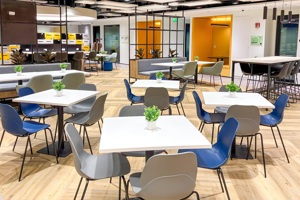Our latest research has found that demand for flexible office space outside of Singapore’s central business district has increased by up to 30% in the last year, driven by a corporate shift towards hybrid-working and “work-near-home” models.
Research[1] from The Instant Group has found that demand for flexible office space outside of Singapore’s central business district has increased by up to 30% in the last year. This demand has been driven by a corporate shift towards hybrid-working and employees embracing new-found flexibility through a “work-near-home” model.
Singapore has also seen a noticeable increase for demand in decentralised locations, such as Clementi, One-North, East Coast and Changi, during the months following the circuit breaker. This trend was driven by employers and individuals creating a more convenient place to work and alternative to home working, while complying with the requirement to have no more than 50% of the workforce within the office. We will be monitoring the data closely to see if this trend continues, when the recently re-introduced safe management measures are lifted.
Emergence of more agile workplace strategies
With over 84% of Singaporeans living outside of the central region[2] with an average commute time of 84 minutes per day[3], many are considering a more hybrid workplace strategy where employees can choose to work either in a centralised office, from home, or a workspace closer to where they live.
The disruption of the pandemic has provided businesses with a unique opportunity to rethink their Real Estate strategies, with a renewed focus on flexibility and a need to future-proof their workplace strategy for unpredictability.
The demand trends in the suburbs for more flexible and agile workspaces correlate with employees demanding more choice and flexibility in the way they work, according to Instant data and surveys of key clients. While a centralised office in the CBD will still have its place as a space to collaborate and allow teams to come together, companies in Singapore appear to be reviewing future options for the creation of a more “hub and spoke” working model with increased satellite offices and enablement of remote working in response to employee demand.
Sean Lynch, Managing Director APAC, The Instant Group said:
“To attract workers back into the office, the purpose of the office needs to change and have a more people-centric focus, with an enhanced employee experience. The pandemic has proven that work can be done from a number of locations, ranging from the home office, a corporate head office and everywhere in between. If it is to prosper in the future, the office needs to offer a unique experience and a place to collaborate and connect with colleagues and promote company culture.
In today’s uncertain climate, clients need agility within their real estate portfolio as they try to predict and prepare for how their businesses will evolve over the coming months and mitigate risk while keeping costs to a minimum. Businesses need agility and the flexible workplace industry across the Asia Pacific region is ideally placed to help businesses thrive in the wake of the pandemic. However, the solution is not without challenges. Working culture and a culture of presenteeism in some corporations needs to change to fully adopt the flexible working model.”
Opportunity beacons for the flexible workspace market
As it stands, the City Fringe and Suburban markets in Singapore have a little over 800,000 sq ft of vacant space[4]. If less than 3% of current CBD occupiers looked to take space outside of the City then the market would be overloaded. Interestingly, and in a sign of what the future of work may look like, 39% of all new development is currently planned outside of the main CBD.
Despite being one of the first countries to have experienced the pandemic, many key operators in Singapore were quick to react to changing market dynamics, enabling them to capture changing demand and drive expansion within the industry. JustCo and We Work have expanded to new locations in Singapore in 2020 and The Executive Centre are expanding in July 2021.
In Singapore, workstation rates have remained relatively stable thanks to government incentives towards landlords and tax rebates towards tenants. Some independent operators were forced to reduce rates during the recovery period of June-July in order to attract new clients, but overall, Instant’s data shows that the market remains in a very positive position and we predict that rates in the co working/ serviced office sector will start to rise due to the increased appetite for flexible workspaces coupled with a slowdown of new supply.
Lynch continues:
"The past year has been challenging for everyone, but aside from a more pronounced dip in demand during the first circuit breaker, the pandemic had less of an impact on demand for flexible office space in Singapore over a 12 month period , which dropped by 13% between 2019 and 2020 compared to dropping by 22% in the UK and EMEA[5]. The pandemic hit at a time when supply of flexible office space in the region was growing at a phenomenal rate, with a growth of 13% throughout 2019 compared to just a 2% rise during 2020. Assuming that the recently re-introduced safe measure restrictions will be short term, 2021 is predicted to be the year for demand to catch up to supply as appetite for flex space returns and operators adapt their offering to meet changing needs.”
[1] The Instant Group proprietary data - 2021
[3] Working while commuting on the way to work/life balance
[4] Cushman and Wakefield – Singapore office market report
[5] How the pandemic is accelerating changes in Asia CRE portfolios – Instant research report - 2021


